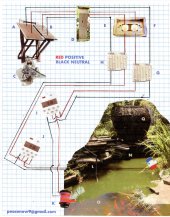SillasMarner
New Member
- Joined
- May 29, 2022
- Messages
- 7
I recently saw a thread that mentioned this step down module and not to wire a panel directly to it.
My seasonally adjustable panels, wired to 12v bilge pumps in a goldfish pond, and have the step down module in between the panel and pump, (with a standard enclosed (so spiders don't nest in it) switch). I was wondering why this admonition? why not to wire it directly from a panel?
I have also had a 12v digital timer post module to occasionally turn the pump off/on automatically. I believe the timer also limits the output to 12v.
I often burn out pumps! Sometimes I have two pumps wired from a single step down module. I think that if I disconnect one pump without turning off all power from the panels, that there is a surge to the other pump, burning it?
I have a seasonable adjustable array with 4 - 20w panels wired parallel, and a 175w panel. with switches at a switch box where the step down and the digital timers are located. I've sometimes wired all 5 panels parallel through a single step down.
Any comments?
My seasonally adjustable panels, wired to 12v bilge pumps in a goldfish pond, and have the step down module in between the panel and pump, (with a standard enclosed (so spiders don't nest in it) switch). I was wondering why this admonition? why not to wire it directly from a panel?
I have also had a 12v digital timer post module to occasionally turn the pump off/on automatically. I believe the timer also limits the output to 12v.
I often burn out pumps! Sometimes I have two pumps wired from a single step down module. I think that if I disconnect one pump without turning off all power from the panels, that there is a surge to the other pump, burning it?
I have a seasonable adjustable array with 4 - 20w panels wired parallel, and a 175w panel. with switches at a switch box where the step down and the digital timers are located. I've sometimes wired all 5 panels parallel through a single step down.
Any comments?
Last edited:



